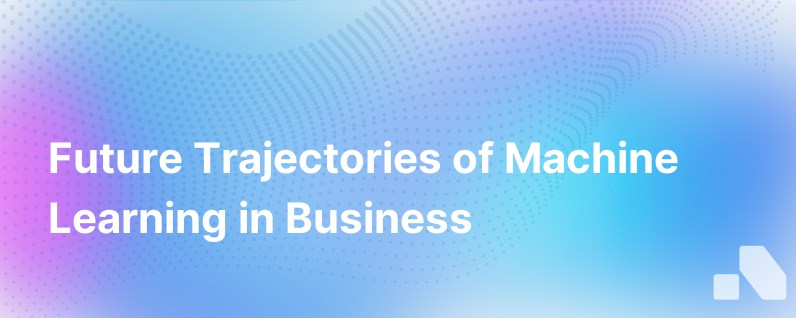
Machine learning, a subset of artificial intelligence, is revolutionizing almost every sector of the economy by enabling algorithms to learn from and make predictions on data. Its applications seem boundless, and its potential continues to grow as the technology matures. This article explores the emerging directions of machine learning and its potential to transform industries, careers, and our daily lives.
The Current State of Machine Learning
Before we journey into the future, let’s understand where we stand. Machine learning has empowered numerous advancements in search engines, recommendation systems, autonomous driving, fraud detection, and even personalized healthcare.
We now live in a world where algorithms can identify a face among millions, suggest the next video you can't resist, anticipate fraudulent transactions, and chart the best route through traffic-clogged streets.
Predicting the Path of Machine Learning
The question isn't just where machine learning can go, but rather where it should ethically and sustainably travel. As we enter this new era, we must steer machine learning wisely, ensuring it serves humanity positively.
Expansion in Healthcare
In healthcare, machine learning is poised to offer more personalized and predictive care. By analyzing vast datasets, algorithms can detect patterns that might elude human experts. From identifying diseases at their inception to tailoring treatment plans to a patient’s genetic makeup, machine learning could usher in a new age of healthcare that's predictive, personalized, preemptive, and participatory.
Environmental Sustainability
Climate change presents another frontier where machine learning could make a significant impact. Analyzing climate models, managing renewable energy resources, and optimizing waste reduction are just a few areas where these algorithms can drive efficiency, reduce human error, and help make more sustainable choices for the planet.
Revolutionizing Work
The influence of machine learning on the workforce is a double-edged sword. While automation may displace certain jobs, it will also create new roles and industries. Skills in data science, programming, and machine learning are becoming increasingly valued, signifying a shift to a more technologically driven economy.
Redefining Art and Creativity
Machine learning is not confined to analytical tasks. In the world of art and creativity, we've already seen algorithms that can compose music, generate realistic images, and even write poems. While these forays into creative fields are impressive, they raise important questions about the nature of creativity and originality.
The Unseen Challenges
As we charter the course ahead, machine learning is bound to face various trials. The ethical and moral implications are at the forefront. Concepts such as privacy, bias, decision accountability, and job displacement are central to discussions about the future of machine learning.
Equity in machine learning is also a growing concern. Ensuring that algorithms are not merely available to the highest bidders but can work for the benefit of all humanity is a mammoth challenge that we as a society need to address.
Ethics and Governance
There's a burgeoning field that combines machine learning, ethics, and policy-making. As governments across the world grapple with how to regulate artificial intelligence, establishing global norms and ethical standards is crucial.
The Next Technical Frontiers
Looking at the technical horizons, here are areas where machine learning will likely make significant strides:
Quantum Computing
With quantum computing in its nascent stages, the intersection of quantum physics and machine learning offers intriguing possibilities. Quantum-enhanced machine learning could solve complex problems faster than traditional computers, potentially revolutionizing fields from cryptography to drug discovery.
Reinforcement Learning
Reinforcement learning, a type of machine learning where algorithms learn to make decisions by taking actions in an environment to maximize some notion of cumulative reward, could transform domains like robotics, business strategy optimization, and automated trading systems.
General-AI
The quest for artificial general intelligence (AGI), where machines can understand, learn, and apply knowledge in a similar way to humans, remains the holy grail of AI research. While there’s a long way to go, breakthroughs in machine learning could pave the way towards achieving AGI.
The Human Touch
For machine learning to truly evolve, it cannot work in isolation from human intelligence and oversight. Human-in-the-loop machine learning, where human judgment is integrated into the learning loop, provides a balanced approach, combining human intuition with algorithmic efficiency.
Conclusion
The future of machine learning is not etched in silicon—it's a canvas we’re actively painting today. Groundbreaking progress lies ahead, but only if we navigate the ethical, technical, and societal hurdles effectively.
Machine learning is poised to transform everything from the way we fight diseases and confront climate change, to how we work and express our creativity. It's a powerful tool, and much like any tool, its impact will depend on how responsibly it's wielded.
As innovators at the forefront of this revolution, platforms like Aomni recognize the transformative power of machine learning in providing actionable competitive insights and personalized sales content. We embrace the future while recognizing the responsibility that comes with it—to guide machine learning towards a trajectory that benefits all. The future is uncharted, but with careful navigation, the potential to create a better world is within reach.